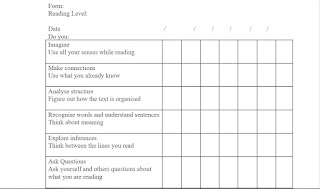"Knowledge might be power, but it’s much more powerful when it’s shared!" (Gary Stringer)
- WHAT is it?
- HOW have you used it with your akonga?
- WHY you think that this strategy is valuable?
I will provide a summary of the presentations from Jeremy and Marc and what I liked from each literacy.
TEACHING READING SKILLS
 |
| Mr. Marc Milford sharing his literacy strategy at our Department Meeting Wk9. |
We are constantly trying to find ways to teaching reading skills to our akonga. Our akonga have had to navigate their learning in pandemic over the last two years and as a result, many of akonga's reading and writing skills have taken a hit. With a lot of them not tracking where they should be in terms of reading skills, so that in itself presents many different challenges for us as kaiako. Marc Milford is one our Literacy experts who works closely with our teacher aides and students, supporting them through a literacy lens. The literacy strategy that Marc shared, Teaching Reading Skills, is all about providing a framework for akonga who struggle with reading. The document he shared outlined how can we identify students who struggle with reading and those who are strong readers. What I particularly liked was the Student Self-Check on Reading Strategies section - which is where students are able to self check and review the reading strategies that they used (after they have completed reading through a text). The students have to tick which area most applies to them and they are able to see how they have gone, what they have done well and what they can work or improve on. Of course you will need to scaffold this with the students and walk through this with them before they can get to a place where they can do the review independently. This is something that I definitely want to do with my Year 9 akonga in Term 2 after our extended text study.
 |
| Literacy Strategy: Teaching Reading Skills (click on the image to access the document) |
P.E.T.A.L
 | |
|
Over the years, all of us in the department have used and continue to use a variety of writing framework. We have all a framework that we are comfortable and familiar with. Mr. Jeremy Spruyt shared a writing frame that he came up and one that he has shared with his NCEA Level 1 English class (in preparation for their Close Viewing Assessment). I have had a privilege of seeing Jeremy introduce this writing framework to his students and to see how engaged, comfortable and confident they are with their writing (using this framework) is awesome. Jeremy shared his Google site with us and directed to the page he created for his writing framework P.E.T.A.L (Point, Example or Evidence, Technique, Analysis + Link). What I enjoyed about Jeremy's literacy strategy was that it was clear and the presentation was simple yet effective. He had a section on his site which breaks down the expectation for each part of the framework and also some sentence starter suggestions. There is also an exemplar for the students to look at, where Jeremy has highlighted which part of the text is P, E, T, A or L. Mr. Faiyaz Hoosein has taken this writing framework on board and he has used it with both his Level 1 and Level 2 students - who have really enjoyed the framework. In particular, students who are either reluctant writers or struggle with writing, have used this framework and they have found a new sense of confidence in their writing because they can see progress. The framework is structured in way that guides students but also empowers them to write (with the right prompts). I am going to definitely use this for my Level 2 English students when they start their Term 2 assessment (91104 - Connections Essay).
 |
| Literacy Strategy: P.E.T.A.L (Click on the link to access Mr. Spruyt's Google site) |
WHANAUNGATANGA: Engaging in positive and collaborative relationships with our colleagues, learners, their families/whanau and the wider community.
Gary Stringer states "The act of sharing knowledge alone is great for building rapport and relationships, where people get that warm fuzzy feeling from either sharing their wisdom or picking up on the wisdom of others." This is true. Whanaungatanga is important dynamic in a relationship and especially in a team environment. Collaboration enables a togetherness within a team that can help and empower everyone involved. I really enjoyed sitting back and seeing what the team are doing with their akonga, it is inspiring and I want to use these strategies in my own classroom. I look forward to prioritizing more sharing of knowledge in our Department meetings as it is a way to keep the team accountable but also it is a positive way for our team to learn from each other.




No comments:
Post a Comment